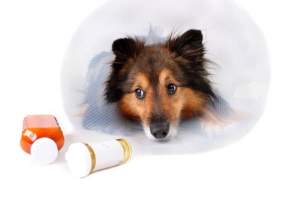
Take Steps to Avoid Pet Medication Errors
Let’s admit it. Dogs and cats can eat some gut-wrenchingly disgusting items and act like nothing ever happened. However, pets can face serious complications if their owners provide the wrong medication. The Food and Drug Administration is asking pet owners to take steps to protect their animals.
Linda Kim-Jung, PharmD with the CVM’s Division of Veterinary Product Safety states, “Unclear medical abbreviations are a common cause of medication errors we find.” Many veterinary students are taught to use abbreviations, and a non-standard abbreviation and poor penmanship can cause prescription errors for your pet.
Another common type of error is a transcription error. Kim-Jung explains a common transcription error: “So, a 5 mg dose written with the trailing zero as 5.0 mg can be misread as 50 mg, or a 0.5 mg dose written without the leading zero as .5 mg can easily be mistaken for 5 mg, potentially resulting in a 10 times overdose if the order is not clearly written.”
A pet owner can easily administer the wrong medication as well. Pets may have to take different medications at different times of the day, and the wrong medication can potentially lead to an overdose.
In order to prevent medication errors, pet owners should take the following steps:
• keep a list of all drugs and supplements your animal is taking, even over-the-counter drugs
• talk with your vet about any adverse reactions you pet had to a medication
• keep pet medications and human medications in different areas
• do not share a pet’s medication without another animal before talking with your vet
• do not give any human medications to your pet without talking with your vet
Pet owners should also talk with a vet about side effects of certain pet medications. Knowing the signs of an adverse reaction to medication can save time and save your pets life in some cases.
Source: U.S. Food and Drug Administration
Comments
Must Read
 Pure Food and Drug Act
Pure Food and Drug ActPURE FOOD AND DRUG ACT TEXT What is the Pure Food and Drug Act? The Pure Food and Drug act of 1906 is a federal law that mandates for the inspection of meat products and forbids the sales, manufacturing or transportation of poisonous patent medicines and adulterated food products.
 4 Facts that you Must Know about Drug Possession
4 Facts that you Must Know about Drug PossessionDrug Possession DefinedA charge furnishing details expressing the illegal possession of Drugs may be defined as the unlawful, illicit, and prohibited ownership of Drugs; however, the nature within which the individual suspect in question gained access to the Drugs may also be associated with the investigation.
 Prempro
PremproWhat is Prempro? Prempro is a dangerous drug that contains medroxyprogesterone and a combination of conjugated estrogens (a mixture of estrogen hormones).
 Amphetamine
Amphetamine What is an Amphetamine?Amphetamines are psycho-stimulant drugs--within the phenethylamine class—that produce increased focus and wakefulness in association with decreased appetite and fatigue.
 Everything to know about Adderall
Everything to know about AdderallWhat is Adderall?Adderall is a form of medication used for attention-deficit hyperactivity disorder and narcolepsy.
